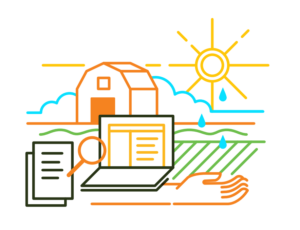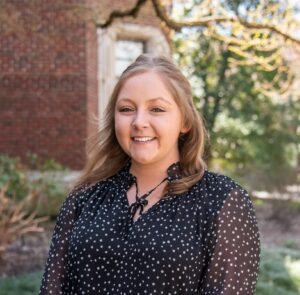SAgE Resources and Trainings

As part of the Farm and Ranch Stress Assistance Network, the Southern Ag Exchange Network collects and disseminates resources for the purpose of alleviating farm stress. But that process is far more than simply doing a Google search and putting the results on the website, explains Emily Ellis, SAgE’s Resources and Trainings Director.

Emily Ellis, Director of Resources and Trainings
Currently the database lists resources from about half of the states that SAgE covers, but Emily, working with partners within the SAgE network, continues the work of verifying what is submitted and soliciting new submissions. “It’s a work in progress, and states will be added as we continue to make connections in those states and gather their input. The ultimate goal is to be able to serve anyone that comes to the website and always have something available for all 13 states and the two territories, all in one accessible place instead of people having to go in search of help,” she says. “The hope is that they will get access to the resources they need before the stressor becomes too heavy. It can be preventative because it's at their fingertips.”
While the live resources database on the SAgE website is an ongoing project, the work began a couple of years ago at a regional meeting in Franklin, TN, where attendees were encouraged to think of resources that they knew of. The SAgE team had provided a list of stressors (health, mental health, financial, labor, legal, weather and disaster, and farm operations and viability) as categories for the resources, and attendees were sent home with a spreadsheet to fill with additional resources for their states.
Vetting
The people who were at that regional meeting were extension specialists and farm service providers, so their provision of a resource means it’s more trustworthy than simply doing an internet search for resources in a county or state. These are professionals who have some experience with those resources, and they’ve referred people to them.
Still, Emily says, the vetting process needs to go deeper, and this is something that Mike McGirr, SAgE’s Director of Strategic Partnerships, has championed. “Our team verifying a resource is one level, but then we want the resources to be qualified by material experts and finally, by farmers themselves,” he says. “That’s when we can really know it’s a gold-star resource: once we have the farmers’ experience with the resource documented, other farmers can recognize it’s being used by their peers.”
Trainings
In addition to providing resources, it is important for people who interact with those in the agricultural community to be able to recognize when stressors begin to impact mental health to a dangerous degree.
There are a number of individuals within the SAgE network who are trained in QPR (Question, Persuade, Refer) and Mental Health First Aid, and many of those are also certified to train others. Both of these are evidence-based, nationally recognized programs for early intervention in suicide prevention. The offering of virtual and in-person QPR and MHFA training as well as train-the-trainer sessions will allow people all over the region to be equipped to step in and offer assistance. And if those people are trained by SAgE trainers, they can refer farmers and agricultural workers to the SAgE hotline and resource database.
Illustration by Matt Stevens
